Related Research Articles

The Bolsheviks, led by Vladimir Lenin, were a far-left faction of the Marxist Russian Social Democratic Labour Party (RSDLP) which split with the Mensheviks at the Second Party Congress in 1903. The Bolshevik party seized power in Russia in the October Revolution of 1917, and was later renamed the Communist Party of the Soviet Union. Their ideology and practices, based on Leninist and later Marxist–Leninist principles, are known as Bolshevism.

Matvei Konstantinovich Muranov was a Ukrainian Bolshevik revolutionary, Soviet politician and statesman.
Yuzhny Rabochy was a Social-Democratic group formed in the South of Russia in the autumn of 1900 around an illegal newspaper of that name. Among the members of the group and the editors of the paper were, at various times, Isaak Lalayants, A. Vilensky, O. A. Kogan, B. S. Zeitlin, Y. Y. and Y. S. Levin, and V. N. Rozanov.
Proletary was an illegal Russian Bolshevik newspaper edited by Lenin; it was published from September 3, 1906 until December 11, 1909. A total of fifty issues having appeared. Active participants in the editorial work were Mikhail Vladimirsky, V. V. Vorovsky, I. F. Dubrovinsky, Anatoly Lunacharsky. Alexander Bogdanov had originally been on the editorial board, but he resigned, being replaced by Virgil Shantser on 13 August 1908. The technical side of publication was in the hands of Alexander Schlichter, E. S. Schlichter and others. The first twenty issues of the paper were edited and set up in Vyborg. Later, in view of growing difficulties in the way of publishing an illegal newspaper in Russia, the St. Petersburg and Moscow Committees of the Russian Social Democratic Labour Party decided that publication of the newspaper should be organised abroad. Nos. 21 to 40 were published in Geneva and Nos. 41 to 50 in Paris.
The Bolshevik Centre was a select group of Bolsheviks that led the organization in secret. The Centre conducted its activities in secret in part so as to avoid the prohibition by the Russian Social Democratic Labour Party ("RSDLP") on separate committees outside of the RSDLP.

Rosalia Samoilovna Zemlyachka, née Zalkind was a Russian revolutionary and Soviet politician. As a revolutionary, she was best known by the alias Zemlyachka, though she also used the party pseudonyms 'Demon' and 'Osipov', and her married name was Samoilova.
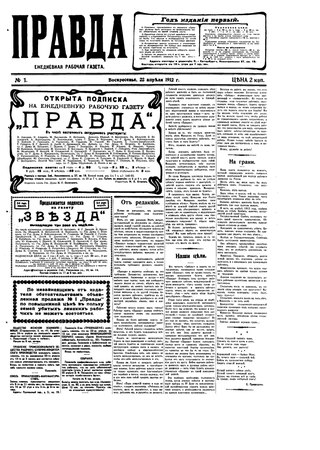
Pravda is a Russian broadsheet newspaper, and was the official newspaper of the Communist Party of the Soviet Union, when it was one of the most influential papers in the country with a circulation of 11 million. The newspaper began publication on 5 May 1912 in the Russian Empire, but was already extant abroad in January 1911. It emerged as the leading government newspaper of the Soviet Union after the October Revolution. The newspaper was an organ of the Central Committee of the CPSU between 1912 and 1991.

Lev Borisovich Kamenev was a Bolshevik revolutionary and a prominent Soviet politician.

Julius Martov or L. Martov was a Russian politician, revolutionary and the leader of the Mensheviks, a faction of the Russian Social Democratic Labour Party (RSDLP). A close associate of Vladimir Lenin, Martov broke with him following the RSDLP ideological split, after which Lenin led the opposing faction, the Bolsheviks.
The Mezhraiontsy (Russian: межрайонцы, IPA:[mʲɪʐrɐˈjɵnt͡sɨ]), usually translated as the "Interdistrictites," were members of a small independent faction of the Russian Social Democratic Labor Party (RSDLP), which existed between 1913 and 1917. Although the organization's formal name was the Russian Social Democratic Labor Party (Internationalists), the names "Mezhraionka" for the organization and "Mezhraiontsy" for its participants were commonly used to indicate the group's intermediate ideological position between the rival Menshevik and Bolshevik wings of the divided RSDLP.
Alexei Pavlovich Skliarenko was a participant is Russia's revolutionary movement.

The 2nd Congress of the Russian Social Democratic Labour Party was held during July 30 – August 23 1903, starting in Brussels, Belgium and ending in London. Probably as a result of diplomatic pressure from the Russian Embassy, Belgian police had forced the delegates to leave the country. The congress finalized the creation of the Marxist party in Russia proclaimed at the 1st Congress of the RSDLP.
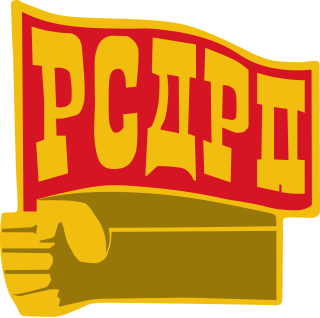
The Russian Social Democratic Labour Party, also known as the Russian Social Democratic Workers' Party or the Russian Social Democratic Party, was a socialist political party founded in 1898 in Minsk.

Jan Antonovich Berzin was a Latvian village teacher, later Bolshevik revolutionary, journalist and Soviet diplomat. He was Ambassador of the Soviet Union to Austria between 1925 and 1927. He was executed during the Great Purge and posthumously rehabilitated in 1956.
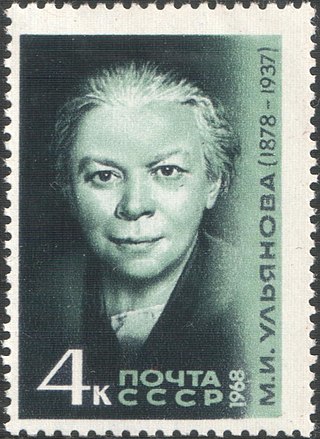
Maria Ilyinichna Ulyanova was a Russian Bolshevik revolutionary, politician, and the younger sister of Vladimir Lenin and Anna Ulyanova.
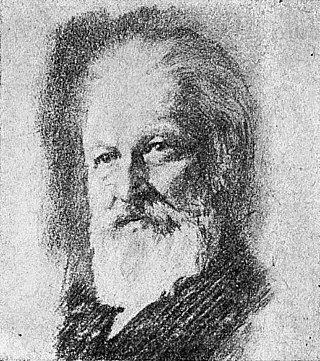
Mikhail Stepanovich Olminsky was a prominent Russian Bolshevik particularly involved with Party history and also an active literary theorist and publicist.

Isaak Khristoforovich Lalayants was a Russian revolutionary, Marxist, Bolshevik and comrade-in-arms of Vladimir Lenin.
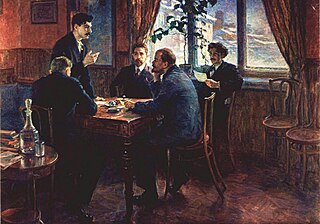
The first conference of the Russian Social Democratic Labour Party (RSDLP) took place in Tampere (Tammerfors), Grand Duchy of Finland, in December 1905. Held between the 1905 London and 1906 Stockholm party congresses at the Tampere Workers' Hall, the conference was an unofficial meeting of the Bolshevik faction of the party. It is particularly remembered for playing host to the first meeting of Vladimir Lenin and Joseph Stalin. The conference resolved to forgo participation in the new State Duma, as did most of the far left parties. They later reversed this decision in 1907.

Mieczysław Kozłowski was a Polish-Lithuanian Marxist revolutionary, Bolshevik, Soviet diplomat and jurist.
Virgil Leonovich Shantser was a Bolshevik revolutionary active in the Moscow uprising of 1905. He became a leading Bolshevik, but followed Alexander Bogdanov into the Vpered faction in 1909. However he contracted an illness and died in 1911.